A world of change: How we've made a difference together this year
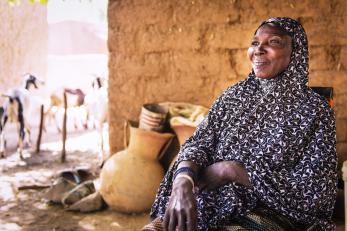
As 2014 comes to a close, we'd like to pause and celebrate the positive changes all around us. The world faces difficult challenges, but your hope for a better future helps change people's lives each and every day.
Your support has given 42.5 million people around the world the resources they need to improve their own lives this year. You’ve helped mothers feed their babies and girls stay in school. You've helped refugees survive harrowing circumstances — and hang on to hope as they look forward. You've helped young people gain employment, people expand their businesses, families grow more food, and communities recover and rebuild from disaster. Our work in more than 40 countries would truly not be possible without your compassion and dedication.
Scroll down to see the difference you’ve made for children, families and communities this year. You know that a better world is possible when we all join together as a global community. Thank you.
Supporting people on the run from conflict
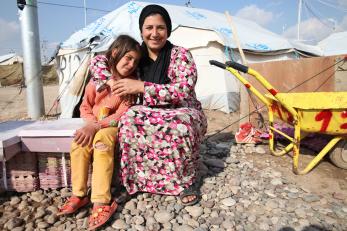
We're helping more than 2.5 million people affected by conflict in Syria and Iraq — including more than 1.7 million people trapped inside war-torn Syria and approximately 700,000 refugees who've fled to neighboring countries.
Host countries like Jordan, Lebanon, Turkey and Iraq — which is now dealing with its own crisis of insurgent fighting — are struggling to meet the needs of such massive displacement. Our teams are focused on providing urgent assistance like food, water, clothing, safe shelter and protection for children, while helping refugees and internally displaced people maintain a sense of dignity in their temporary homes. Learn more ▸
Protecting Syria's next generation
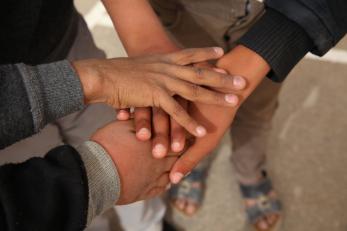
We're empowering more than 50,000 Syrian refugee youth and their peers in host communities to continue their learning and improve their communities.
Torn from their homes, many of these adolescents are losing the chance to go to school, make friends and dream for their own futures. We support their long-term emotional recovery and teach them skills to ensure that this generation can rebuild their country and their futures. Learn more ▸
Helping communities stop Ebola
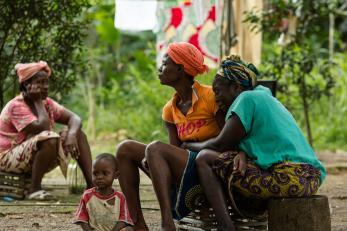
Our public health education campaign is equipping two million people in Liberia with the facts and resources they need to protect themselves and their families from Ebola. This work joins the global effort to stop the outbreak at its source. We're working with trusted local leaders who can provide credible information to their communities and prevent the disease from spreading any further.
We're also addressing a looming hunger crisis brought on by the epidemic, which has debilitated farming and trade in the region. We're working to provide emergency food distributions, cash assistance and seeds and tools for farmers to prepare for the upcoming planting season. Learn more ▸
Responding to crisis in South Sudan
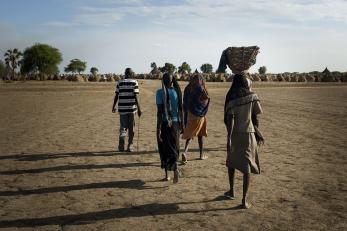
Mercy Corps was one of the few active humanitarian organizations in the capital of Juba when violence erupted on the streets last December. It was the start of a political conflict that's still raging across the young country. We immediately launched an emergency response, providing essential supplies — blankets, mosquito nets, kitchen tools, water cans, soap, clothing and mattresses — to 84,000 people who fled for safety in makeshift camps.
We've also delivered clean water and improved sanitation for 35,000 people still living in displacement sites, increasing hygiene and cholera awareness and building emergency latrines to prevent the spread of disease. This work continues, along with building temporary learning spaces for 7,000 children to keep up with their education.
We want to make sure all progress is not lost to this war, so we're focused on keeping communities as productive as possible — providing employment for families to earn an income, helping traders restock markets, and distributing seeds and tools for people to plant gardens and stave off hunger. Learn more ▸
Surviving conflict in Gaza
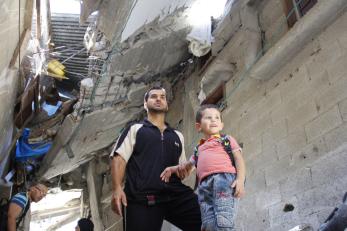
When fighting reignited in Gaza this July, our team on the ground worked through active conflict to help people survive. We provided emergency food and hygiene supplies to more than 221,000 people taking shelter from the violence, and established 20 temporary water points to give people safe access to clean water.
After a ceasefire finally held, families received tarps and shelter supplies to begin repairing their homes that were damaged in the bombings. Our psychosocial programs are focused on helping the youngest survivors regain a sense of safety and heal from the trauma they endured. Learn more ▸
Recovery in the Philippines
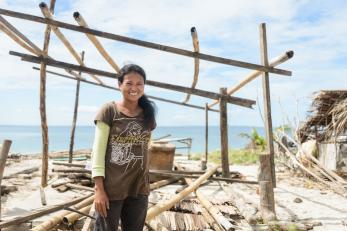
Since Typhoon Haiyan tore through the Philippines just over one year ago, we've been working on four of the hardest-hit islands to support the long-term recovery of more than 125,000 survivors.
Immediately after the disaster, our emergency responders delivered food, water and supplies to thousands of families on remote islands that were battered by the storm. We repaired water and sanitation services to help communities emerge from the destruction stronger than before. And to jumpstart the rebuilding process, families received cash transfers and access to mobile banking — the first financial services many survivors ever had. Learn more ▸
Safe places for kids to play and heal
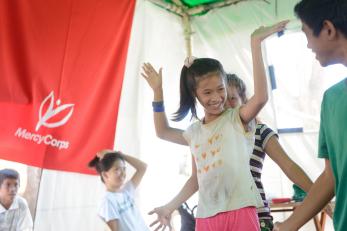
When natural disasters hit or violence erupts, children are often the most affected by what they see and experience. After Typhoon Haiyan ravaged the Philippines and when conflict rocked Gaza, we provided psychological support and healing play for more than 22,000 children.
We also build playgrounds, create safe spaces and lead healing programs for children displaced by the wars in South Sudan and Syria. At Jordan's Zaatari refugee camp, for example, our 13 child-friendly spaces welcome 395 kids each and every day. After suffering through traumatic events, we know how important it is for children to express themselves in ways that help them recover and move forward.
Access to clean water
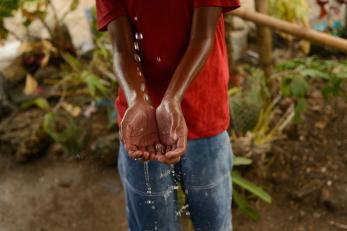
This year, two large-scale construction projects gave 1.25 million people better access to clean drinking water in Jordan — one of the world's driest countries whose resources are strained to support Syrian refugees — and the Democratic Republic of Congo, where a volcano destroyed the water system of a city crowded with displaced families.
Women and children often spend hours every day just fetching water, and many girls drop out of school because they are responsible for gathering the family’s water. So making sure people have a close, reliable source of clean water has a ripple effect — women are safe from the dangers of long walks, children can stay in school and the whole family is healthier.
Healthy mothers and children
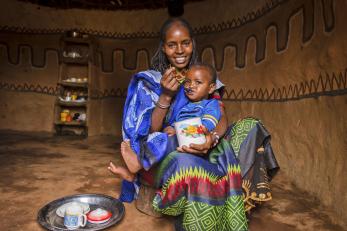
We provided food and treatment for malnutrition to keep 306,000 people healthy in the Democratic Republic of Congo, Ethiopia, Guatemala and Niger.
Approximately 80,000 were pregnant and lactating women and children under five, which is the critical window of time to ensure proper nutrition and prevent lifelong health problems. We help families grow new vegetables, diversify their diets, and promote breastfeeding and teach healthier meal preparation through community-led mother care groups. Learn more ▸
Growing more food
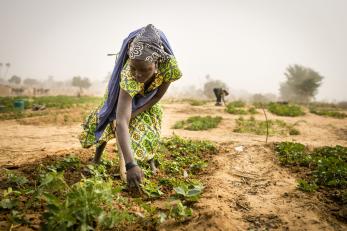
In the past year, we helped 147,500 people — in places like Sudan, Indonesia, Guatemala, Niger, the Democratic Republic of Congo, Uganda, Pakistan, Ethiopia and India — grow more food on their land.
When a community has bountiful harvests, everyone benefits. Families are healthier and people have more opportunities to earn a steady income. Mercy Corps helps small farmers manage their land, adapt to changing climates, increase their yields and diversify crops to produce a larger, more nutritious and stable food supply. Learn more ▸
Learning for the future
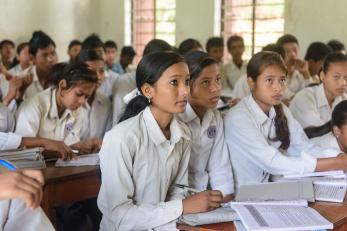
Our youth programs have provided new opportunities to nearly three million adolescents worldwide. To help individuals and communities reach their full potential, we aim to bring access to education to all young people in the places we work.
Just this year, we've helped more than 35,000 young people in Nepal and Somalia continue their education or get vocational training. Learn more ▸
Empowering women and girls
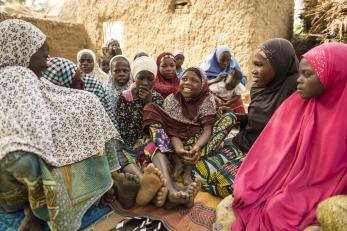
In the past year, we've worked with more than 22,000 people in the Central African Republic and Niger to raise awareness about gender equality and protect the rights of women and girls.
In CAR, our listening centers help victims of gender-based violence get counseling, legal and vocational services to move forward with their lives. In Niger, our adolescent girls groups give young women a safe place to discuss healthy life choices, delaying marriage and childbirth, and learn financial and business skills.
Mercy Corps works to build gender equality into all of our programs because we believe communities are stronger when women and girls are equally empowered to have opportunities and a voice in driving change. Learn more ▸
Fostering economic growth — and lasting change
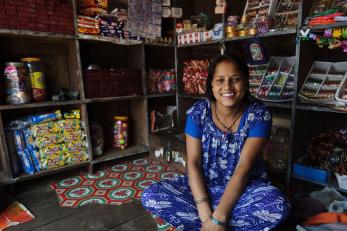
Through our network of microfinance institutions and economic development programs, we've helped more than 270,000 people earn higher incomes or expand their small businesses in places like Nepal, Timor-Leste, Myanmar, Indonesia, Kyrgyzstan and Mongolia.
Markets, whether large or small, keep communities thriving. Around the world, we identify appropriate opportunities and provide vocational training, start-up loans, equipment and technical support so entrepreneurs can get started — and keep growing their businesses. They earn sustainable incomes, provide jobs and supply their communities with the goods they need — and improve their lives for the long term. Learn more ▸